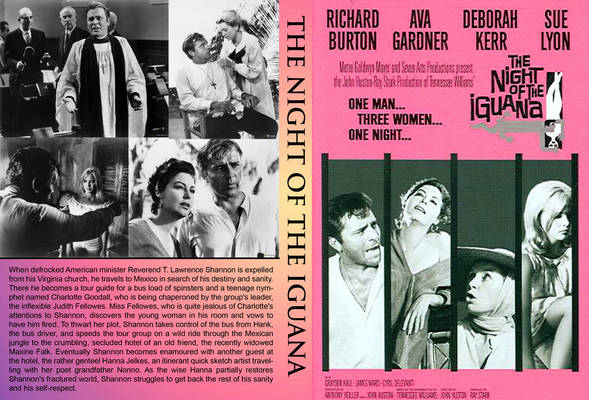
THE NIGHT OF THE IGUANA
US, 1964, 114 minutes, Black and white.
Richard Burton, Deborah Kerr, Ava Gardner, Sue Lyon, Grayson Hall.
Directed by John Huston.
The Night of the Iguana was a successful play by Tennessee Williams. It had been adapted for the screen by director John Huston. Huston had made an impact as a writer in Hollywood in the 30s and 40s, moving to direction with The Maltese Falcon. He directed a number of classics over a very long career?
Richard Burton is ideally cast as the disillusioned clergyman though he sounds rather more rhetorical at times than he might have sounded when the film was released. Ava Gardner suits the part of Maxine the hotel proprietor (created by Bette Davis on stage). Deborah Kerr does yet another of her repressed spinster performances - although she is given many lines of great wisdom. Sue Lyon, after Lolita, plays a variation on the Lolita character. Grayson Hall is rather frightening as the tour guide unaware of her lesbian orientation.
The setting is Mexico, a seedy hotel, a group of tourists under the guidance of the defrocked alcoholic cleric, Shannon. They stay at Maxine's hotel and there are various crises of personality and relationships.
The film has a number of excellent lines from Tennessee Williams: he refers to a voluptuous crucifixion, roped on a green hill instead of nailed on Golgotha. He also refers to man's inhumanity to God - the pain that men inflict on God. He refers to the repressed spinster as thin standing-up female Buddha. As regards Miss Fellowes, Shannon has compassion about her ignorance of her sexual orientation and how it clearly manifests itself. He says she is a highly moral person and if she realised the truth about herself it would destroy her. Hannah, the Deborah Kerr character, also has some wise lines when she says it's not the person, it's his circumstances that matter and refers to one-night communications rather than one-night stands. She speaks about nesting and resting emotionally, humans building nests in the heart of another. Any light is a good light in a long dark tunnel - and she says that she is not so unsure of God as she was. Hannah is a character of interior smouldering, especially as she recalls the story of the Australian businessman whom she met and who asked her to remove pieces of clothing - but yet had only a platonic relationship with her. She does not regard sexuality as dirty - "nothing in human disgusts me unless it is unkind or violent".
These lines are significant for the film but also indicate some of the moral perspectives of Tennessee Williams himself.
1. The film as a classic? In the canon of John Huston's film's? In Tennessee Williams' dramas? The cast?
2. The adaptation of the play, the opening out for the church locations, the Mexican locations, the hotel, the roads, the countryside, the beach? The realistic presentation of the characters and events? Stylised, rhetorical speeches?
3. The title, Mexico, the atmosphere, the beach, the coast, the iguanas, the role of the iguana - especially when it was tied up and freed? As a symbol?
4. The introduction to Shannon, as a minister, his fiery sermon in the church, driving out the people? As a man, his relationships, his sexual appetites? His anger, attitude to the church and the people, the attack on hypocrisy? His being defrocked?
5. The beach resort, Maxine and her style, her relationship with Shannon, the guests? Hannah and her father, the treatment of the father? The busload of tourists, Shannon and bringing them to Maxine, the accommodation, the meals, Maxine tough, giving them a welcome? Their having to stay? The staff, the beach boys?
6. Shannon and his becoming a tour guide, his drinking, the information, his attitudes, his treatment of the American women, the old woman and her being puffed out, Miss Fellowes and the songs, the cheeriness? The young girl, her background, coming on to Shannon, his response, Miss Fellowes and her reaction? Shannon's drinking and dissolute manner, the reaction of the driver? The clashes, reports to the authorities, Miss Fellowes wanting a phone line, taking them to Maxine's?
7. The relationship between Shannon and Maxine, her being at the end of her tether, having to cope with Miss Fellowes, the young girl? Miss Fellowes and her angers, the meals? Hannah and her talking, understanding, challenge?
8. Hannah and her life, genteel, the confidence trickster father and his poems, Hannah complicit in this? His age, sleeping, composing and uttering like an oracle? The collection of money after the recitations? The relationship between Maxine and Hannah, Maxine's sympathy? The issues of sexuality, talk, Hannah and her stories, listening, her God-talk? Her concern about Miss Fellowes and her sexual orientation?
9. The young girl, flirting, her parents, sending her on the trip, Miss Fellowes as chaperone, her trying to elude her, with Shannon, flirting, with the beach boys, on the beach, the ending and her attack on Shannon?
10. Miss Fellowes and her manner, being mannish, complaining, exhorting the women to sing? Wanting a phone connection to complain? Maxine's putting her off? Her threat to tell the young girl's parents? Her angers, attacks, her not being aware of herself, being broken by the journey?
11. The beach boys, their relationship with Maxine, dancing, the sexuality?
12. The driver, his exasperation with Shannon, with the passengers, complaining to the company, staying at the hotel?
13. The Night of the Iguana, its being tied, like Shannon? Crises, being freed? Shannon and his depths, talking, Hannah and her help, decisions? Maxine and her offer for him to own and work at the resort? The control of Shannon, with the iguana - and playing God?
14. The religious of the film, the dialogue, the darkness, the shadows, hypocrisy, sexuality, drinking, conversion? A film, ultimately of hope or not?